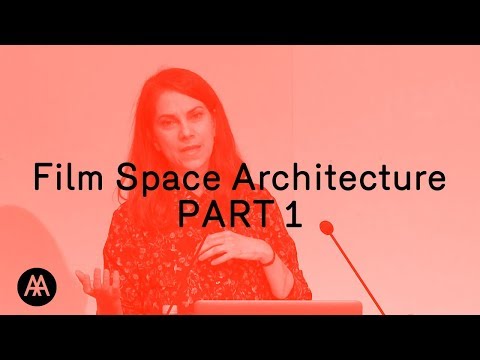
27 April 2018
Symposium, Organised by Brian Hatton
PART2: https://youtu.be/pjL51GibT5A
PART3: https://youtu.be/l8BCFeWw790
This symposium will examine how films offer means of spatial rendition of interest to architects. One is through motion, by montage, focal range, and camera mobility. A second way occurs in fiction films through the acting-out of behavioural, affective and psychological potentials that may be suppressed in actual buildings and places. Films are an archive of evidence of how rooms, buildings, and places might be lived : as ‘truth 24 times per second’ (Godard) and/or as a ‘ribbon of dreams’ ( Welles). Digital techniques – Computer-assisted Design [CAD] and Computer-generated Imagery [CGI] – now converge architectural design with filmmaking, bringing new reasons for architects to watch movies.
Ian Christie is Professor of Film & Media History at Birkbeck College. He has published on many aspects of film history, including Eisenstein and Russian cinema, Powell & Pressburger, Gilliam and Scorsese, and worked on exhibitions including Spellbound (1996), Modernism (2006) and Russian Art 1917-32 (2017). His current interests include the history of visual media, space & place on screen, audiences and storytelling in the digital era.
Professor Emeritus at the Royal College of Art, Nigel Coates studied and taught at the AA with Bernard Tschumi. With his students from Diploma Unit 10, he formed the group NATØ – ‘Narrative Architecture Today’. With Doug Branson his office designed many shops, restaurants, clubs and galleries Japan.
Mark Cousins is Head of History and Theory at the Architectural Association.
Penelope Haralambidou is a Senior Lecturer at the Bartlett School of Architecture, UCL, where she coordinates a Unit that combines design with digital film. She authored ‘Marcel Duchamp and the Architecture of Desire.’ (2013), and ‘The Architectural Essay Film’ in ARQ (Sept.2015), and at Birkbeck College in 2017 introduced a conference on the ‘Essay Film’.
Brian Hatton teaches at the AA and Liverpool John Moores U., where in 2016 he arranged the symposium ‘Film, Space, Architecture’. For the Milan Triennale in 1994 he designed an exhibition of Liverpool around film shot from the Overhead Railway. At CCA Montreal he was 2009 Senior Mellon Fellow, studying the theme of ‘Wandering In The Open Plan’.
Richard Koeck is Professor at Liverpool School of Architecture, where he directs CAVA, Centre for Architecture & Visual Arts. Co-editor of ‘Cities in Film: Architecture, Urban Space & the Moving Image’, ‘The City & the Moving Image’ and ‘Cinematic Urban Geographies’ (2016), he has also authored ‘Cine|Scapes: Cinematic Spaces in Architecture & Cities’ (2012) and ‘Inhabiting the Image of the City’ (2018).
Robert Maxwell studied architecture under Colin Rowe at Liverpool U., has taught at the AA and the Bartlett School, and was Dean of Architecture at Princeton University. Among his publications are ‘Sweet Disorder and The Carefully Careless’, ‘James Stirling, Michael Wilford’, ‘A Few Years of Writing’, and ‘Ancient Wisdom & Modern Knowhow’ .
François Penz is Professor of Architecture and the Moving Image at Cambridge University, where he directs the Digital Studio for Research in Design, Visualisation & Communication. With Richard Koeck he edited ‘Cinematic Urban Geographies’, and he recently published ‘Cinematic Aided Design: An Everyday Life Approach to Architecture’.
Renée Tobe is a Reader in Architecture at University of East London. Her 2017 book, ‘Film, Architecture and Spatial Imagination’ is a study of how we interpret architecture through film. She is currently recipient of a Mellon Research Fellowship at the British School at Rome.